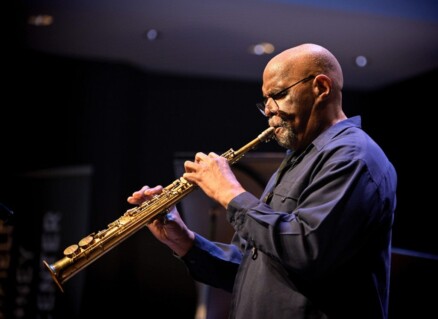Special feature | Fifty years later, remembering a golden album by Stan Getz and Charlie Byrd

by Ken Avis
CapitalBop contributor
What a month for bossa nova. Not only did Antonio Carlos Jobim, perhaps the best known of the genre’s originators, receive a Lifetime Achievement Award at Sunday’s Grammy Awards. What’s more, exactly 50 years ago this month, on February 13, 1962, a local D.C. band fronted by guitar great Charlie Byrd recorded the album Jazz Samba with Stan Getz on sax, in Pierce Hall at D.C.’s All Souls Church. With an immediate and unprecedented impact, the album arguably did more to bring samba and bossa nova to world attention than any other single record.
We can only speculate on whether bossa nova would have become a cornerstone of the jazz repertoire without this catalytic recording. The only jazz album ever to reach No.1 on Billboard’s pop chart, Jazz Samba remained on the chart for 70 weeks. It spawned a musical and marketing craze, helping inspire everyone from Frank Sinatra to Miles Davis to Elvis Presley to record bossa albums.
For guitarist Charlie Byrd, originally from Chuckatuck, Va., the recording provided the springboard to an international career spanning five decades and more than 100 albums in the jazz and classical genres. Getz was already a star in the jazz world, but the success of the album led him to greater fame and a string of Grammy Awards for his immensely popular recordings with Brazilian artists. Among these, the most notable were guitarist and composer João Gilberto (who was reportedly less than enthusiastic about collaborating with Getz) and his wife, vocalist Astrud Gilberto. Most importantly, the album bought recognition to Brazilian bossa musicians, who were barely known beyond their own communities.
***
Stories of how Jazz Samba came about are subject to some controversy, as witnessed by the subsequent legal challenges detailed in David Adler’s 2004 JazzTimes article, “Give the Drummer Some.” http://jazztimes.com/articles/14733-stan-getz-and-charlie-byrd-give-the-drummer-some No one questions, though, that the Charlie Byrd Trio first heard bossa nova during a State Department-sponsored tour of Latin America in 1961. The purpose of the tour was to take U.S. culture to other countries. Happily, the exchange flowed both ways, and the trio returned with more than they’d bargained for: a bunch of bossa nova albums, plus some first-hand schooling from Brazilians in the percussive rhythms of the bossa style.
One year later, Byrd was able to hook legendary Verve Records producer Creed Taylor into recording the album, which combined traditional samba and the ‘”new wave” of bossa nova in the songs of Jobim, Baden Powell and Ary Barrosa, all delivered through the instrumental jazz sound of saxophone and nylon-string guitar.
Initial efforts to record the music with different musicians were unsuccessful until, with just a few days’ notice, the band assembled at All Soul’s. DJ Rusty Hassan of WPFW 89.3 recalls a later conversation with Byrd, who explained that the original intention was to record the album at D.C.’s 16th St. Jewish Community Center. Due to the noise of passing buses, they had to find an alternative venue, and came across All Souls Church a few blocks further up the street. They booked Pierce Hall for five dollars, and the seven-track session was recorded in four hours, live to stereo with only a couple of microphones and the natural reverb of the hall. Getz took the return shuttle to New York that same evening.
The lineup was unusla, with two drummers, Bill Reichenbach and Buddy Deppenschmidt, plus Keter Betts on bass and Charlie’s brother Joe “Gene” Byrd on guitar and bass. Still, the work they committed to tape on that February afternoon held a magic that captured the public ear immediately. Deppenschmidt and Joe Byrd, the only surviving musicians from the original recording session, have both confided that they had no expectation of the album’s immense global success.
***

Upon Jazz Samba’s release in April 1962, legendary D.C. radio DJ Felix Grant championed its innovation. By December, Grant was serving as an emcee at Washington, D.C.’s Lisner Auditorium, introducing a who’s-who of Brazil’s new bossa nova stars in a repeat of a similar event in November at Carnegie Hall in New York. These celebrated U.S. concerts brought Gilberto, Jobim and Sergio Mendez to the attention of the public, and to musicians like Sinatra, who went on to record with Jobim. Bossa nova became such an integral part of the North American musical DNA that pop diva Dionne Warwick is reported to have frustrated a reporter in Rio who had told her the style was invented in Brazil. Warwick deadpanned, “Everyone knows that Burt Bacharach invented bossa nova.”
For their involvement in Brazilian music, Felix Grant and and Charlie Byrd were given awards in Brazil; Grant received the Order of the Southern Cross, and Byrd was honored with the status of Knight of Rio Branco. He was also deemed a Maryland Art Treasure, and is recognized with an annual Charlie Byrd concert series at The Mainstay on the Upper Eastern Shore of the Chesapeake Bay. An international star, Byrd eventually settled in Annapolis and played locally throughout his life, in addition to touring internationally with his band. He died in 1999, but the music he created and inspired with Jazz Samba lives on.
—
Ken Avis is a musician in the band Veronneau, which is currently recording a commemorative 50th anniversary album of bossa songs featuring music from Jazz Samba, along with a companion documentary video. The album will be released in May with a concert at Pierce Hall, All Souls Church.
Editor’s note: The article has been amended to reflect the following correction: Charlie Byrd did not attend Peabody Conservatory, as was stated in an earlier version of the piece. He studied at the Virginia Polytechnic Institute, or Virginia Tech, and performed in the orchestra there.
All Souls Church, bossa nova, Charlie Byrd, DC, DC jazz, golden anniversary, jazz, Jazz Samba, Stan Getz, Washington



